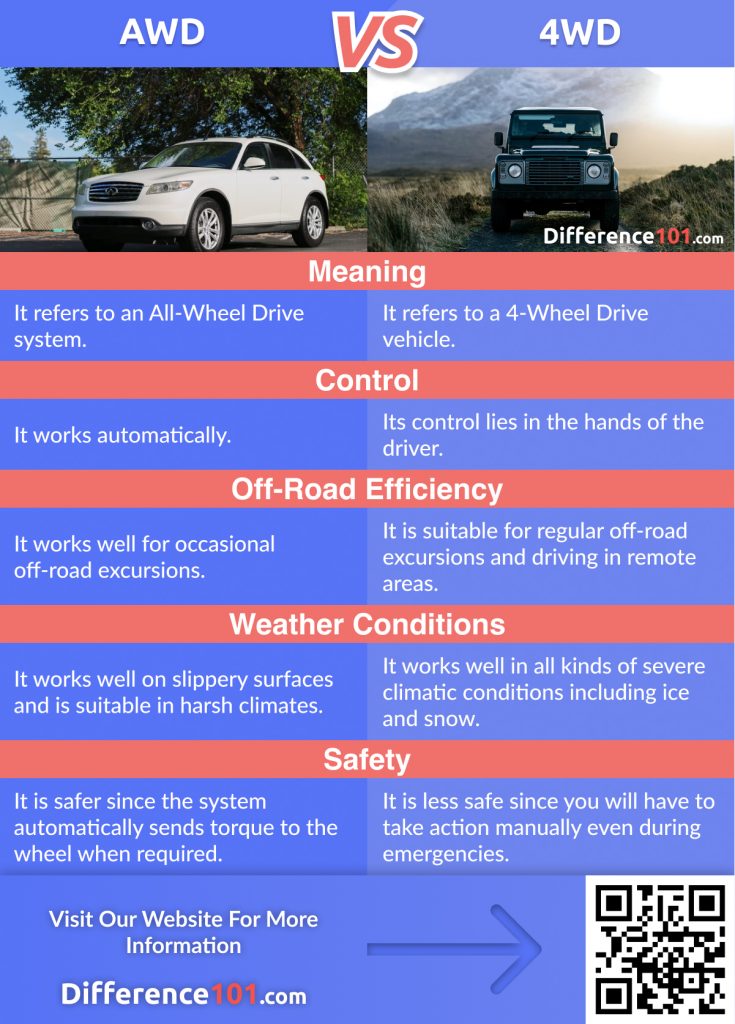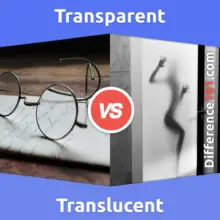AWD vs. 4WD: Since both AWD and 4WD send power to all the wheels, it becomes difficult to differentiate between the two systems. The biggest difference between AWD and 4WD lies in their operation with the former always being operative and the latter requiring the driver to pull a lever or push a button for activation.
Table of Contents
Considering AWD vs. 4WD definitions for deeper understanding
What is AWD?
AWD refers to an All-Wheel Drive vehicle whose powertrain is capable of sending power to all the wheels either full-time or when need be.
What is a 4WD?
4WD refers to a Four-Wheel Drive vehicle whose drivetrain is capable of sending torque to all the wheels simultaneously.
Looking at the similarities between AWD and 4WD
- Both AWD and 4WD vehicles are capable of powering all 4 wheels at the same time.
- Both these car systems are good for off-terrains.
- They add considerable weight to the vehicle, thereby compromising its fuel economy.
- Both demand additional investments in the form of higher vehicle costs.
- Your vehicle’s resale value is also higher if it is fitted with any one of them.
- Both AWD and 4WD are excellent options for people living in mild to harsh weather conditions.
Considering AWD vs. 4WD in snow: Is AWD or 4WD better in the snow?
Choosing between AWD and 4WD depends on the snow conditions you are generally exposed to. In normal snow conditions or occasional snowy weather, AWD works better since it will automatically provide torque to all the vehicles and ensure your safety. However, if you are regularly exposed to severe snow conditions with deeper snow, 4WD is a better choice.
What is the difference between 4×4 and 4WD?
There is no difference between 4×4 and 4WD. 4×4 is just another name for 4WD.
Does AWD help on ice?
Yes, AWD is helpful on ice to some extent. An All-Wheel Drive sends power to the individual wheels when traction of one or more wheels is lost. It helps in starting a vehicle stuck in ice and assists with acceleration on smooth surfaces. However, it is not helpful in the vehicle’s turning or braking mechanism in any way.
Who makes the best AWD system?
German automobile manufacturer Audi makes the best AWD system called Quattro. The highly complex system sends faster signals for individual wheel speed variances resulting in increased traction and exceptional cornering. Additionally, Quattro’s advanced electronic control systems provide it an edge over the other AWD technologies. Other notable mentions include Subaru Symmetrical AWD, Ford’s Intelligent AWD, and Acura’s Super Handling AWD.
Does AWD use more gas?
Yes, the AWD system uses more gas than a 2-Wheel Drive as it consumes extra energy in sending power to all 4 wheels of the vehicle. It also has to turn more gears and shafts for automatic shifting consuming more power in their functioning.
Is AWD more expensive to maintain?
Yes, vehicles with AWD systems are more expensive to maintain whether we talk about AWD sedans, AWD sports cars, or AWD minivans. It is because of the use of extra components fitted into these vehicles as part of the AWD system. You will have to carry out regular repairs on these additional vehicle parts. Also, the fuel costs are higher than a 2WD vehicle because of the use of more power.
Is AWD safer than FWD?
Yes, AWD is safer than Front-Wheel Drive in many aspects. Considering FWD vs. AWD, the latter responds quickly when in need and helps keep your vehicle stable on wet pavements.
Listing the advantages and disadvantages of AWD and 4WD for understanding
What are the advantages of AWD?
- It ensures your safety as it works automatically either full-time or when the traction of one or more wheels is lost.
- It is extremely useful on slippery surfaces.
- It has a higher resale value.
- Because of its automatic functioning, it is safer in situations where quick traction is required.
- It works well in mild to harsh weather conditions.
- It provides a good performance during occasional off-road excursions with normal to rough driving surfaces.
What are the disadvantages of All-wheel Drive?
- It adds to the initial cost of the vehicle.
- It harms the fuel economy of your vehicle.
- It adds to the regular maintenance cost of the vehicle
What are the advantages of 4WD?
- It works extremely well in severe weather conditions.
- A 4WD is the best choice for regular off-road excursions as it works efficiently on all surfaces.
- It doesn’t hamper the fuel economy much since you manually activate the system whenever required.
- It increases the resale value of your vehicle.
What are the disadvantages of 4WD?
- You have to engage the system every time the traction is lost.
- Due to the absence of automatic functioning, it is less safe in emergencies.
- It adds to the regular maintenance cost of the vehicle because of the use of extra components fitted to run this system.
- It adds up to the initial cost of the vehicle.
What is the difference between AWD and 4WD?
| Basis | AWD | 4WD |
|---|---|---|
| Basis | AWD | 4WD |
| Meaning | It refers to an All-Wheel Drive system. | It refers to a 4-Wheel Drive vehicle. |
| Control | It works automatically. | Its control lies in the hands of the driver. |
| Off-road efficiency | It works well for occasional off-road excursions. | It is suitable for regular off-road excursions and driving in remote areas. |
| Weather conditions | It works well on slippery surfaces and is suitable in harsh climates. | It works well in all kinds of severe climatic conditions including ice and snow. |
| Safety | It is safer since the system automatically sends torque to the wheel when required. | It is less safe since you will have to take action manually even during emergencies. |
Comparison Chart

Comparison Video
Conclusion: Is All-Wheel Drive as good as 4-Wheel Drive?
The major AWD vs. 4WD difference lies in the automatic vs. manual control they provide. Along with that, your driving conditions are an important consideration. For occasional off-road or harsh weather driving, an AWD is as good as a 4WD. However, for driving in extreme weather and remote areas, 4WD is better than AWD.







